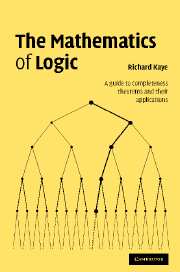Book contents
- Frontmatter
- Contents
- Preface
- How to read this book
- 1 König's Lemma
- 2 Posets and maximal elements
- 3 Formal systems
- 4 Deductions in posets
- 5 Boolean algebras
- 6 Propositional logic
- 7 Valuations
- 8 Filters and ideals
- 9 First-order logic
- 10 Completeness and compactness
- 11 Model theory
- 12 Nonstandard analysis
- References
- Index
4 - Deductions in posets
Published online by Cambridge University Press: 28 January 2010
- Frontmatter
- Contents
- Preface
- How to read this book
- 1 König's Lemma
- 2 Posets and maximal elements
- 3 Formal systems
- 4 Deductions in posets
- 5 Boolean algebras
- 6 Propositional logic
- 7 Valuations
- 8 Filters and ideals
- 9 First-order logic
- 10 Completeness and compactness
- 11 Model theory
- 12 Nonstandard analysis
- References
- Index
Summary
Proving statements about a poset
The last chapter set out a formal system for which we had to work quite hard to find a mathematically interesting semantics. In this chapter we study another formal system for which the intended semantics is clear: it is about deductions one can make in a poset or family of posets. In fact, the proof system we shall give here provides a formal version of the sorts of arguments you may already have used in an informal way when formulating an argument about a poset.
Amongst other things, we introduce here the important idea of subproofs and the Reductio Ad Absurdum Rule that will be used in this system and other systems throughout the rest of this book. Our logical analysis of posets will result in some useful, though technical, existence theorems. As a corollary we will deduce a nice result about converting a partial order into a linear order.
Suppose we have a poset X and elements a, b, c, d ∈ X. We might be interested in determining which of these four elements is less than or greater than which of the others. If we know a small number of facts about them, we can sometimes deduce other facts.
For example, if we know that a < b and b < c then we can deduce that a < c by the transitivity axiom of a partial order. Similarly, if we know that b < c and d < c we can deduce that d < b.
Information
- Type
- Chapter
- Information
- The Mathematics of LogicA Guide to Completeness Theorems and their Applications, pp. 38 - 54Publisher: Cambridge University PressPrint publication year: 2007
